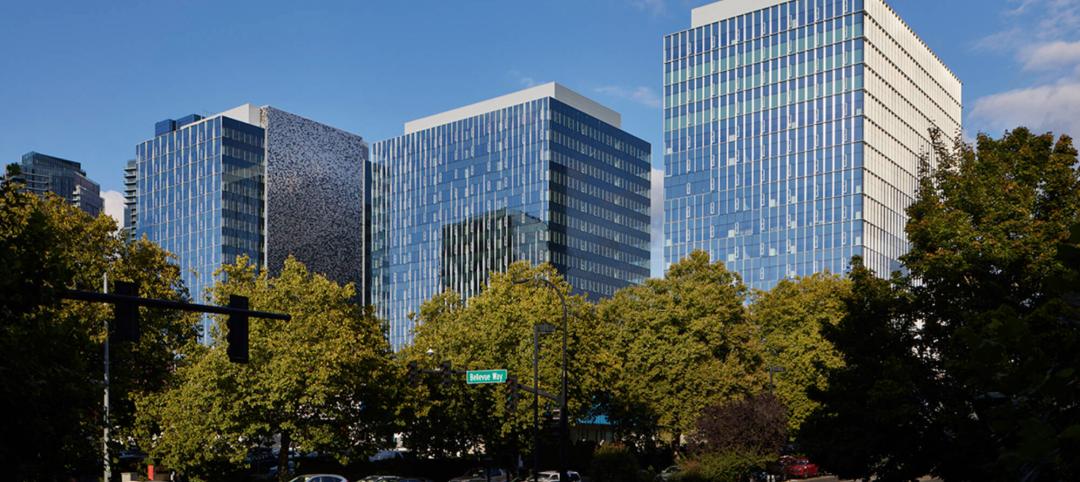The U.S. Department of Energy today announced the release of the first in a new series of Advanced Energy Design Guides (AEDGs) to aid architects and engineers in the design of highly energy-efficient office buildings. The 50% AEDG series will provide a practical approach to commercial buildings designed to achieve 50% energy savings compared to the commercial building energy code used in many areas of the country. This 50% AEDG for Small and Medium Office Buildings is the first in a series of four to be released in the coming months. These commercial building guides support President Obama’s goal to reduce energy use in commercial buildings 20% by 2020 and will help drive demand for energy-saving products made in the United States.
Not only will these guides help builders achieve performance beyond the current energy code, but they will also provide recommendations detailing how designers can incorporate available technology to achieve these savings. The guides help architects and engineers choose energy-efficient designs for daylighting, building envelope assemblies, and heating and cooling systems, among other technologies. The guides also recommend equipment commonly available from manufacturers and reduce the time and cost burdens otherwise required in order for designers to individually model energy use for specific high performance buildings. Additionally, the guides will inform the development of future commercial building energy codes.
The Advanced Energy Design Guide for 50% energy savings in Small and Medium Office Buildings is now available for free download.
The 50% Advanced Energy Design Guide series is being developed through a partnership with the American Society of Heating, Refrigerating and Air-Conditioning Engineers (ASHRAE), American Institute of Architects (AIA), U.S. Green Building Council (USGBC), and Illuminating Engineering Society of North America (IESNA). The Small and Medium Office guide is the first installment in the 50% Series, which will address three additional major commercial building types: K-12 Schools, Medium to Big Box Retail Buildings, and Large Hospitals.
The Advanced Energy Design Guide for K-12 School Buildings is the second guide being developed in the 50% series, and is currently open for peer review through Friday, May 13, 2011. This guide is intended to provide user-friendly, 'how-to' design guidance and efficiency recommendations for elementary, middle and high school buildings, resulting in facilities that consume 50% less energy than conventional schools.
Interested parties may download a copy of the draft. The download link is under the 'Planned Guides' heading halfway down the page. Please also download the review input form and instructions to record and submit your review marks. The final version is scheduled for completion in September 2011.
Related Stories
AEC Tech Innovation | Oct 8, 2024
New ABC technology report examines how AI can enhance efficiency, innovation
The latest annual technology report from Associated Builders and Contractors delves into how artificial intelligence can enhance efficiency and innovation in the construction sector. The report includes a resource guide, a case study, insight papers, and an essay concerning applied uses for AI planning, development, and execution.
Healthcare Facilities | Oct 8, 2024
Herzog & de Meuron completes Switzerland’s largest children’s hospital
The new University Children’s Hospital Zurich features 114 rooftop patient rooms designed like wooden cottages with their own roofs. The project also includes a research and teaching facility.
Mixed-Use | Oct 7, 2024
New mixed-use tower by Studio Gang completes first phase of San Francisco waterfront redevelopment
Construction was recently completed on Verde, a new mixed-use tower along the San Francisco waterfront, marking the end of the first phase of the Mission Rock development. Verde is the fourth and final building of phase one of the 28-acre project that will be constructed in several phases guided by design principles developed by a design cohort led by Studio Gang.
Brick and Masonry | Oct 7, 2024
A journey through masonry reclad litigation
This blog post by Walter P Moore's Mallory Buckley, RRO, PE, BECxP + CxA+BE, and Bob Hancock, MBA, JD, of Munsch Hardt Kopf & Harr PC, explains the importance of documentation, correspondence between parties, and supporting the claims for a Plaintiff-party, while facilitating continuous use of the facility, on construction litigation projects.
Glass and Glazing | Oct 7, 2024
Pattern language: An exploration of digital printing on architectural glazing
Architectural Glazing has long been an important expressive tool which, when selected and detailed thoughtfully, can contribute to the successful transformation of architectural concepts to reality.
University Buildings | Oct 4, 2024
Renovations are raising higher education campuses to modern standards
AEC higher ed Giants report working on a variety of building types, from performing arts centers and libraries to business schools. Hybrid learning is seemingly here to stay. And where possible, these projects address wellness and mental health concerns.
AEC Tech | Oct 3, 2024
4 ways AI impacts building design beyond dramatic imagery
Kristen Forward, Design Technology Futures Leader, NBBJ, shows four ways the firm is using AI to generate value for its clients.
Laboratories | Oct 2, 2024
Trends in scientific research environments: Q&A with Flad's Matt McCord
As part of an ongoing series, Matt McCord, AIA, NCARB, LEED AP BD+C, Associate Principal with Flad Architects, discusses the future of the scientific workplace.
Museums | Oct 1, 2024
UT Dallas opens Morphosis-designed Crow Museum of Asian Art
In Richardson, Tex., the University of Texas at Dallas has opened a second location for the Crow Museum of Asian Art—the first of multiple buildings that will be part of a 12-acre cultural district. When completed, the arts and performance complex, called the Edith and Peter O’Donnell Jr. Athenaeum, will include two museums, a performance hall and music building, a grand plaza, and a dedicated parking structure on the Richardson campus.
Data Centers | Oct 1, 2024
10 biggest impacts to the data center market in 2024–2025
While AI sends the data center market into the stratosphere, the sector’s accelerated growth remains impacted by speed-to-market demands, supply chain issues, and design innovation necessities.
















